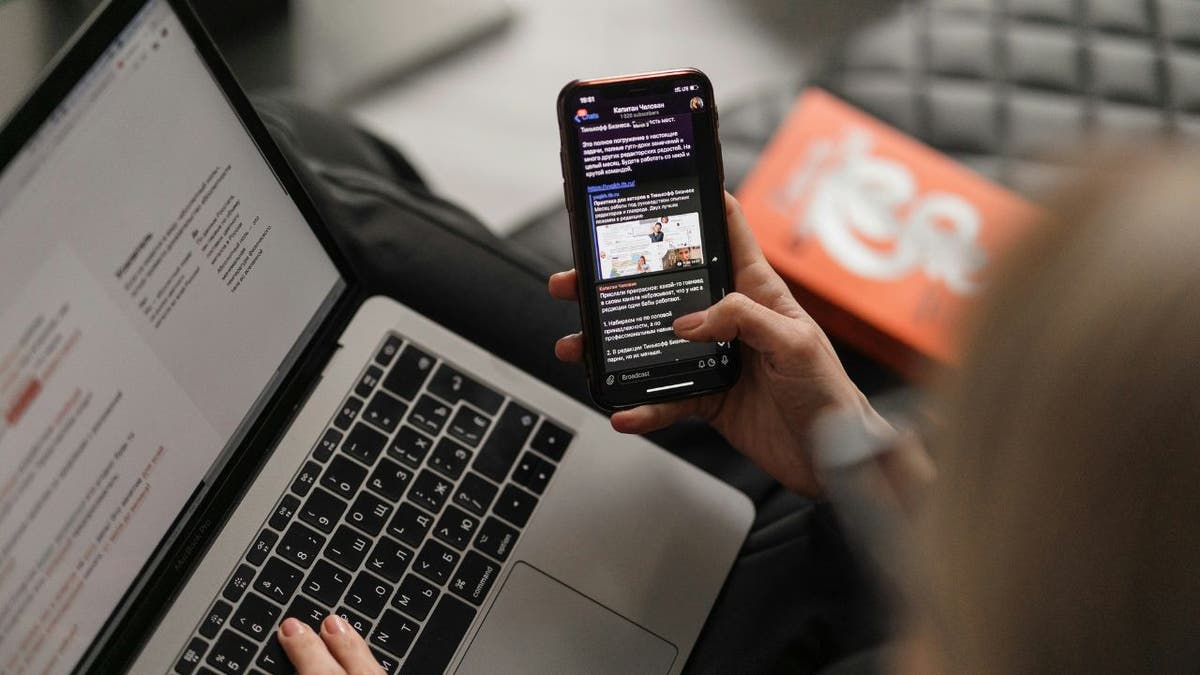Your smartphone might be your closest companion, tracking your steps, saving your passwords and remembering your favorite takeout. But how much do you know about how it protects (or exposes) your privacy?
We’re breaking down five key mobile privacy terms that could make all the difference when it comes to keeping your personal info safe. Whether you’re team iPhone or Android, understanding these concepts can help you take control of your digital footprint — right from the palm of your hand.
Stay tuned for more in this series as we dive deeper into privacy-related tech terms and other essential concepts, answering the top questions we get from readers like you.
A woman working on her laptop (Kurt “CyberGuy” Knutsson)
1. Location tracking
Your phone’s GPS isn’t just for directions
Every time you check the weather, tag your location on Instagram or ask Google Maps for the quickest route, you’re sharing your whereabouts. That’s thanks to Location Tracking, a feature built into most apps and devices that uses GPS, Wi-Fi, Bluetooth or cell towers to pinpoint your location.
Here’s the catch: Many apps track you even when you’re not using them. Some use this data to serve local content or ads, while others collect and sell it to third parties.
How to protect yourself:
- Check which apps have location access in your settings
- Switch from “Always” to “While Using the App”
- Consider turning off location services entirely when you don’t need them
Knowing when and how you’re being tracked is the first step to stopping it.
More: Top 20 apps tracking you every day
2. App permissions
What your apps know about you (and maybe shouldn’t)
Before you can use that new photo editor or budgeting tool, it probably asked for a few things — access to your camera, contacts, microphone, maybe even your calendar. These are called App Permissions, and they determine what parts of your phone an app can interact with.
WHAT IS ARTIFICIAL INTELLIGENCE (AI)?
While some requests are necessary (e.g., a video app needs camera access), others can be excessive or even suspicious. For example, why does a flashlight app need your location or call logs?
Tips for staying in control:
- Review permissions when installing apps
- Regularly audit your app settings
- Delete apps you no longer use
Your data shouldn’t be the price of convenience. Set boundaries.
More: Did you say ‘yes’ to allowing apps permission to your Google account?

A woman looking at her phone while working on her laptop (Kurt “CyberGuy” Knutsson)
TOP 20 APPS TRACKING YOU EVERY DAY
3. Two-factor authentication (2FA)
A second lock on your digital front door
Passwords aren’t perfect. That’s where two-factor authentication (2FA) comes in. It adds an extra layer of protection by requiring two forms of identification before granting access to your account, typically something you know (a password) and something you have (a text code or authentication app).
Many major apps and platforms now support 2FA, and enabling it can help block hackers, even if they steal your password.
GET FOX BUSINESS ON THE GO BY CLICKING HERE
Most common types of 2FA:
- Text or email codes
- Authenticator apps like Google Authenticator or Authy
- Biometric verification (fingerprint or face ID)
Activate 2FA where you can. It’s one of the simplest ways to level up your mobile security.
4. Mobile ad ID
The invisible label that tracks your habits
Behind the scenes, your phone is assigned a unique string of numbers and letters called a mobile advertising identifier (Mobile Ad ID). It helps advertisers track your behavior across apps and websites to build a profile of your interests.
While it doesn’t include your name, it can be linked to your device and used to serve targeted ads. Think of it as a digital name tag for marketing purposes.
Want to opt out? You can:
- iPhone: Go to Settings > Privacy & Security > Tracking
- Android: Settings > Privacy > Ads, and reset or delete your Ad ID
You’re not obligated to let your phone advertise you.
More: How to escape Facebook’s creepy ad tracking

A laptop and external storage devices on a desk (Kurt “CyberGuy” Knutsson)
10 SIMPLE STEPS TO IMPROVE YOUR SMARTPHONE’S SECURITY AND PRIVACY
5. VPN (virtual private network)
Your personal privacy tunnel
A VPN is like a secret tunnel for your internet connection. It hides your online activities and helps keep your personal information safe when you’re using the internet, especially on public Wi-Fi.
In addition to protecting your information from prying eyes, a VPN also hides your real location. It allows you to connect to the internet through a server in another part of the world, which makes it appear as though you’re browsing from a different location. This is useful for security (protecting your privacy) and for accessing content that might be restricted in certain areas.
When you connect to public Wi-Fi at a coffee shop or airport, your data can be exposed to hackers and snoops. That’s where a VPN (virtual private network) comes in. It encrypts your internet traffic and routes it through a secure server, hiding your IP address and protecting your activity.
Think of it as a private tunnel for your internet usage, shielding your data from prying eyes.
What VPNs are great for:
- Protecting your connection on public Wi-Fi
- Accessing region-locked content
- Hiding your online activity from advertisers or your internet provider
Just make sure to choose a trustworthy VPN. Some free VPNs may log your data or slow your phone down. A reliable VPN is essential for protecting your online privacy and ensuring a secure, high-speed connection. For best VPN software, see my expert review of the best VPNs for browsing the web privately on your Windows, Mac, Android and iOS devices
DATA REMOVAL DOES WHAT VPNS DON’T: HERE’S WHY YOU NEED BOTH
Kurt’s key takeaways
Your mobile device is powerful, but so are the privacy risks associated with it. By understanding these five mobile privacy terms, you can take simple yet impactful steps to protect your digital life. From turning off unnecessary app permissions to enabling two-factor authentication, these small tweaks can help you stay in control and keep your information safe.
CLICK HERE TO GET THE FOX NEWS APP
Confused by a mobile tech term or want help tightening up your privacy settings? Drop your questions below. We’ve got more tips coming your way. Let us know by writing us at Cyberguy.com/Contact
For more of my tech tips and security alerts, subscribe to my free CyberGuy Report Newsletter by heading to Cyberguy.com/Newsletter
Ask Kurt a question or let us know what stories you’d like us to cover
Follow Kurt on his social channels
Answers to the most asked CyberGuy questions:
New from Kurt:
Copyright 2025 CyberGuy.com. All rights reserved.




